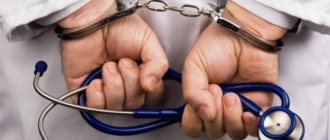Cases of adverse health care outcomes are often published in the media and receive public outcry. Lawyers note an increase in the number of complaints and litigation related to the provision of medical care. If a medical criminal case has not yet been initiated or is already being considered by the investigative authorities, the first thing to do is to seek help and advice from an experienced medical lawyer.
Sergey Gritsko has 17 years of experience in criminal law, defending the interests of patients whose health has been harmed and doctors accused of medical crimes.
Types of violations entailing criminal liability:
- causing death by negligence. Every case of death of a person within the walls of a healthcare institution or, in some cases, at home, is examined to find grounds for initiating a criminal case;
- causing harm to the patient's health. The severity of the harm may vary, but the main thing for qualifying a crime will be intent;
- untimely provision of medical care;
- leaving in danger. The profession is taken into account only if the situation involved the provision of medical care;
- performing illegal abortion;
- HIV infection;
- any means of forcing a patient to remove organs.
You need to prove 3 things:
- The presence of a defect in the provision of medical care.
- Causing serious harm to human health or causing death is a consequence of the action (inaction) of a doctor.
- There is a direct cause-and-effect relationship between a defect in the provision of medical care and the infliction of serious harm to the patient’s health (death).
How to prevent gross violations so as not to go to jail
It cannot be said that cases of criminal prosecution of employees of medical institutions are rare. Therefore, each such institution has developed its own methods for preventing violations.
There are also general, most commonly used methods to prevent violations and litigation.
The most important thing is to conduct regular assessments of the quality of medical care. Such checks are carried out by special medical insurance organizations, which send their expert to the hospital. He collects the necessary documents, evaluates the quality of work of employees in a particular medical institution and, based on this, recommends where violations should be eliminated.
Health care workers should always pay attention to patient complaints. If multiple patients report the same violation during the course of their medical care, doctors should request an unscheduled inspection to find the violation.
Often a so-called medical commission is created, which consists of qualified doctors, and is headed by the head of the entire hospital. This commission constantly monitors the quality of medical care provided and strives to improve these indicators.
In addition to the listed prevention methods, the medical institution can also send individual patient records with their medical history and treatment. There is no need to worry about violations of medical confidentiality, because the disclosure of treatment history occurs to employees of a special institution, which is licensed to check the quality of treatment provided by the hospital.
The fault of health workers
Defects in the provision of medical care are actions, inactions, and non-compliance with established procedures, rules and standards.
Art. 24 of the Criminal Code of the Russian Federation contains different types of guilt, two main types are intent and negligence and 2 of their subtypes.
When applied to medical matters, these 4 types of guilt may look like this:
- If we are talking about a direct form of intent, we are talking about situations where the doctor knew in advance about the potential danger of his actions, and could have assumed that they could cause damage to the life and health of the patient, but committed them. The doctor must not only know, but also desire the occurrence of these consequences; in medical criminal cases, this situation does not occur often due to the nature of the activity, one of the foundations of which is the prevention of harm.
- The second type includes cases where the health worker knew about the potential danger, did not want harm to life and health to be caused, but did not take measures to prevent negative consequences.
- From a legal point of view, a doctor or nurse will be guilty if they committed criminal negligence. Because much of the work responsibilities in healthcare is regulated, healthcare professionals must understand the potential dangers of their actions. If an employee ignored this danger, it means he committed negligence or improper performance of duties.
- This type of negligence includes cases where the doctor or nurse was overconfident or underestimated the potential danger of the situation. For example, they thought that they could cope with the consequences on their own.
Criminal intent and criminal negligence
Criminal intent presupposes that the offender has a motivation to cause harm to another person. There are several forms of intent:
- direct intentional. In this case, the physician is aware of the consequences of his actions. It is important to find out for what reasons the motivation to commit a crime arose. Perhaps it was committed out of revenge or under the influence of drug intoxication;
- criminal omission. In this case, the physician realizes that the life and health of the patient depends on his inaction, but does nothing to improve the situation;
- negligence (carelessness). Negligence is said to be the case if a physician was negligent in the performance of his own professional duties;
- frivolity: the doctor did not appreciate the harm from his actions or behaved too arrogantly.
IMPORTANT! It is quite difficult to assess the harm caused by the actions of doctors to a patient. After all, people often turn to medical institutions when their health condition leaves much to be desired. In order to determine whether a crime has occurred, a forensic examination is necessary.
How to choose a lawyer?
The most serious discussions usually take place on the issue of the guilt of a medical worker.
Cases of defects in the provision of medical care cause acute rejection and moral condemnation of society and often reveal systemic problems in domestic healthcare. All this creates distrust of doctors among the population, which is why more and more complaints are being received. Representatives of the medical community are forced to defend themselves and sometimes hide facts about the work of their colleagues out of solidarity. But at the same time, clear-cut situations are extremely rare. In each individual case, there may be many different factors influencing the events that occurred. Therefore, when choosing a lawyer for medical cases, practical experience in this field is so important, because when assessing the actions of doctors, it is necessary to take into account all factors, including the condition of the patient himself and his medical history.
Prevention methods
There are methods for preventing the occurrence of criminal liability that can be used within a specific medical institution when providing medical care. First of all, this is monitoring the quality of medical care. If there are complaints from patients or their relatives, a medical commission comes to the aid of doctors. The convening of such a commission is an opportunity, fixed in law, on the part of a medical institution to confirm or refute the actions that were carried out by doctors.
Article 48 of Law No. 323 states that the medical commission consists of doctors and is headed by the head of the medical organization or one of his deputies. It is created in order to improve the organization of medical care, make decisions in the most complex and conflict cases on issues of prevention, diagnosis, treatment and medical rehabilitation, determine the working capacity of citizens and the professional suitability of certain categories of workers, assess the quality, validity and effectiveness of diagnostic and treatment measures , including prescribing medications, transplantation of human organs and tissues, as well as making decisions on other medical issues.
The decision of the medical commission is documented in a protocol and entered into the patient’s medical documentation. Subsequently, this protocol can play a very important role if a criminal case is initiated against the doctor and if a forensic medical examination is ordered. The protocol of the medical commission evaluating the actions of the doctor is an opportunity to convey one’s position on the case under consideration. Clinical doctors are isolated from forensic medical examination and cannot communicate directly with experts, but the protocol of the medical commission has the opportunity to reflect in detail all the circumstances of the case: how right or wrong the doctor acted, what standards he followed and what indications he was guided by when prescribing this or that treatment , and so on.
Prevention methods also include sending individual cards and other medical documentation to obtain an expert opinion on the quality of medical care, often played by independent forensic experts. This procedure should not be confused with a forensic medical examination, which is appointed either by an investigator or by a court order. If a medical organization, on its own initiative, transfers any medical documents to an expert institution that has a license to conduct a forensic medical examination, then in this case it receives a conclusion from a specialist or a commission of specialists. This method is effective when within the medical institution it is not possible to obtain answers to questions of interest in the case or in cases where it is necessary to obtain evidence on the case under consideration.
By law, a medical organization has all the rights to transfer copies of medical documents to an expert institution to obtain an opinion, and the patient’s consent does not need to be obtained, despite medical confidentiality. Clause 4 art. 13 “Maintaining medical confidentiality” of Law No. 323 states that the provision of information constituting medical confidentiality without the consent of a citizen is possible, including for the purpose of monitoring the quality and safety of medical activities. In this case we are talking about quality control. When transferring medical documents, you must make sure that the expert institution has a license to conduct forensic medical examinations.
Help from a lawyer in criminal medical cases
Articles of the Criminal Code related to negligence, causing serious harm or death due to negligence, danger associated with failure to provide services, etc. are most often applied to doctors.
Before a criminal case is initiated
Before a doctor is charged, there are several stages of investigation. At the very beginning, relatives or the patient himself contacts the investigative authorities with a statement about the crime committed. Next, the investigator conducts a preliminary check of the information received from the applicant. The main task of this stage is to identify facts that could indicate the classification of the crime. For this purpose, all relevant information of a medical or other nature is requested, and a forensic medical examination is appointed.
If you contact a criminal medical lawyer in a timely manner, you can build a line of defense or prosecution even before a criminal case is initiated.
Depending on the situation, the lawyer may request:
- attaching to the materials documents that can confirm the guilt or innocence of the doctor;
- calling for a survey of persons who could positively characterize the doctor or confirm the words of the patient who wrote the statement;
- supplementing the list of questions for experts that must be answered during the examination, etc.
After the initiation of a criminal case
If the investigator decides to initiate a criminal case, the assistance of an experienced lawyer will be crucial.
You should not neglect the personal presence of a lawyer during interrogation, even if the medical worker is involved in a criminal case as a witness. A lawyer will help check the protocol so that all words are recorded from the witness’s words accurately and correctly.
If a doctor/nurse is suspected or accused of a crime under the Criminal Code of the Russian Federation, the presence of a defense lawyer during the interrogation is necessary. In such a situation, it is worth choosing a professional lawyer with industry experience that the medical professional is willing to trust.
Unfortunately, the lawyers appointed by the investigator, if the accused or suspect cannot invite one, are not so interested in a positive outcome of the case, and may miss some facts and opportunities.
You need to choose a lawyer who will fight for the rights of his client and insist on their implementation. Do you need qualified legal assistance in the field of medical criminal law? Contact lawyer Sergei Gritsko right now.
Death on the operating table is always a reason for criminal proceedings against a doctor
Of course, not in every case will a doctor be held criminally liable for the death of a patient during an operation. If the relatives of the deceased have no claims against the doctor, because there were no grounds for this in the form of violations on his part when he provided medical services to the deceased, then everything ends without the police and the court.
If the patient’s relatives suspect that the person who performed the operation was dishonest, an investigative investigation begins. Of course, the most important reason for starting such proceedings will be the suspicion of the violent death of the patient.
Every hospital must have a pathologist who can determine the cause of death. However, if a trial begins, the doctor does not have the right to conduct the examination himself. Now forensic experts will deal with this.
The medical examiner himself performs the autopsy and determines the cause of death of the victim. After this, based on the data received, the employee draws up a protocol with a report that the medical organization itself cannot receive. All that hospital management can require is a brief report on the patient's condition at the time of death.
Punishments for crimes in the field of medicine
The types of liability of medical workers (criminal and administrative) depend on the severity of the act committed, the presence of intent and other factors.
The following penalties may be imposed for crimes in the field of medical activities:
- fine. They are used if the patient’s health has not been seriously harmed and there is no intent in the doctor’s act;
- deprivation of the right to hold certain positions or engage in certain activities. This measure of criminal liability for medical workers is used quite often, for example, in cases where the patient died due to the actions of a doctor. In this case, after serving a prison sentence, the doctor may be deprived of the right to work in his specialty for several years;
- forced labor. Used if the physician showed criminal negligence or was involved in forging certificates and prescriptions;
- restriction of freedom. Such punishment is often imposed if a person was illegally engaged in medical or pharmaceutical activities;
- arrest and imprisonment. These measures are considered extreme. They are used if the crime was committed with intent, while serious harm was caused to the patient’s health or the consequences of the doctor’s actions resulted in the death of a person.
IMPORTANT! When assigning a sentence, the court takes into account mitigating circumstances, for example, the advanced age of the doctor or positive characteristics from his place of service.
Arbitrage practice
In practice, the following crimes are most often committed:
- incorrect diagnosis. The success of subsequent treatment largely depends on the correct diagnosis. Making an incorrect diagnosis qualifies as negligence. Often such mistakes are made due to the fact that the doctor refused to involve colleagues and did not take into account all the symptoms identified in the patient. As a result, punishments such as forced labor or imprisonment for up to five years may be imposed;
- falsification of medical documentation. Criminal liability for this type of crime occurs both for the one who signed the document and issued it, and for the person who used the false certificate. Issuing a certificate entails a fine of up to 40 thousand rubles;
- infection with infectious diseases. Nurses, who perform most of the medical procedures, are most often guilty of this crime. For contracting HIV infection, a nurse will face liability in the form of imprisonment.










